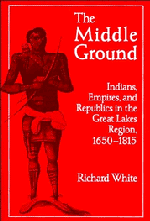Book contents
- Frontmatter
- Contents
- List of abbreviations
- Introduction
- 1 Refugees: a world made of fragments
- 2 The middle ground
- 3 The fur trade
- 4 The alliance
- 5 Republicans and rebels
- 6 The clash of empires
- 7 Pontiac and the restoration of the middle ground
- 8 The British alliance
- 9 The contest of villagers
- 10 Confederacies
- 11 The politics of benevolence
- Epilogue: Assimilation and otherness
- Index
9 - The contest of villagers
Published online by Cambridge University Press: 05 August 2012
- Frontmatter
- Contents
- List of abbreviations
- Introduction
- 1 Refugees: a world made of fragments
- 2 The middle ground
- 3 The fur trade
- 4 The alliance
- 5 Republicans and rebels
- 6 The clash of empires
- 7 Pontiac and the restoration of the middle ground
- 8 The British alliance
- 9 The contest of villagers
- 10 Confederacies
- 11 The politics of benevolence
- Epilogue: Assimilation and otherness
- Index
Summary
Every child thus reared, learns to hate an Indian, because he always hears him spoken of as an enemy. From the cradle, he listens continually to horrid tales of savage violence, and becomes familiar with narratives of aboriginal cunning and ferocity. Every family can number some of its members or relatives among the victims of a midnight massacre … With persons thus reared, hatred towards an Indian becomes a part of their nature, and revenge an instinctive principle.
James Hall, Sketches of History, Life, and Manners in the WestOur white Brethren who have grown out this same Ground with ourselves - for this Big Island being our common Mother, we & they are like one Flesh and Blood.
Cornstalk, June i, 1776, Morgan DiaryWe are sprung from one common Mother, we were all born in this big Island; we earnestly wish to repose under the same Tree of Peace with you; we request to live in Friendship with all the Indians in the Woods … We call God to Witness, that we desire nothing more ardently than that the white & red Inhabitants of this big Island should cultivate the most Brotherly affection, & be united in the firmest bands of Love & friendship.
American Commissioners for Indian Affairs to Delawares, Senecas, Munsees, and Mingos, Pittsburgh, 1776, Morgan LetterbookIn one sense, the impact of the American Revolution on the pays d'en haut was simple. By creating another expansionist state, the Revolution recreated familiar dangers and equally familiar opportunities for the Algonquian villagers of the region.
- Type
- Chapter
- Information
- The Middle GroundIndians, Empires, and Republics in the Great Lakes Region, 1650–1815, pp. 366 - 412Publisher: Cambridge University PressPrint publication year: 1991

